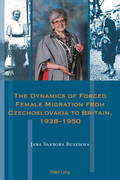Jana Buresova talks about women refugees from former Czechoslovakia to the UK, from 1938 onwards
The ‘refugee question’ remains perpetually topical. Government policies wax and wane, public sympathy ebbs away or gives way to prejudice, and the refugees in question generally remain anonymous, no longer ‘stories’. Yet behind the headlines and the broad sweep of history are the personal challenges, successes and failures worthy of consideration, and the contributions to the host country that merit recognition — as in the case of women from the former Czechoslovakia who found refuge in Britain between 1938 and 1950 (and onwards).
These women risked their lives to escape. Yet how does one reconcile the difficulties experienced in a foreign country, with the benefit of safety from an oppressive authoritarian regime, be it fascism or communism? If the past is truly ‘another country’, should one leave it behind, or recreate it in a new one? Is there indeed a choice, and if so, how is this realized in an alien environment? These dilemmas resonate into the twenty-first century.

It is exactly such issues that my book addresses. Although it focuses on women, it certainly does not exclude men, nor is it a composite review of gender theories. Rather, it complements works concerning the Czechoslovak armed forces that served in Britain during the Second World War and aims to fill a gap about the lives of women refugees hitherto neglected in British-Czechoslovak socio-political historiography.
That gap was apparent from both perspectives. Young people growing up during the communist era had little or no notion of the lives of their compatriots in Britain, regarded as traitors by the regime. Meanwhile, many second generation children in the Diaspora have, as mature adults, only belatedly sought information about their parents’ backgrounds. The gap was therefore treated in two ways: by archival research and, despite the potential pitfalls of oral history, by giving the women a ‘voice’ and recording it for posterity.
My book traces the chronology of these refugee women from Czechoslovakia to Britain: their reasons for leaving, arrival and adjustment, internment, experience of cultural institutions, wartime service, contributions to society and, ultimately, the problems of repatriation/remigration. It also highlights certain challenges faced by women alone: the ‘gender role swap’, whereby women had to take on the head of family role from the men, and their role as mothers, raising children with a sense of Czechoslovak identity away from the homeland.
Many of these women came to feel liberated in exile. Owing to straitened circumstances, some women developed useful practical skills, while others found that their independence allowed them to pursue careers not previously imagined to be within their scope. What emerges is a sense of humour, a will to ‘get on and make the best of things against all odds’ and a determination to ‘do their best for their children, to give them a better chance in life’. The majority of women interviewed had created a future built on the past.
I have been asked why I never included anything of my own family background, but it was important to stand back from the topic I wished to present in a balanced, not a personal or emotive manner. Nevertheless, it is there, embedded in the various accounts of other people!
Interviewing them was a privileged insight into their private lives and thoughts.
Jana Barbora Buresova is the author of “The Dynamics of Forced Female Migration From Czechoslovakia to Britain, 1938–1950“. Following its publication in 2019, she was awarded the Honorary Silver Medal of Jan Masaryk ‘For outstanding contributions to the development of relations’ between the Czech Republic and Britain.
She is currently a committee member of the Research Centre for German & Austrian Exile Studies at the University of London, where she completed all her degrees, is co-authoring a book about the Czech Refugee Trust Fund in Britain, and interviewing Second World War refugees/camp survivors for an oral history archive project.
